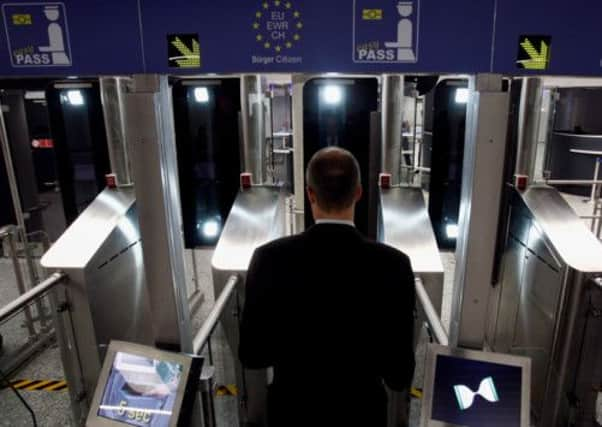Scottish independence: EU may force border terms


A report by Strathclyde University academic Professor Robert Wright argues European Union nations would insist Scotland joined the Schengen area, the passport-free zone which covers almost all of the EU.
As the UK and Ireland are not part of Schengen, Scotland would therefore no longer be part of the Common Travel Area (CTA) within the British Isles, raising the prospect of checkpoints and patrols at the Scotland- England border, he adds.
Advertisement
Hide AdAdvertisement
Hide AdHowever, Prof Wright says that in this scenario, Ireland would be likely to follow suit and join Scotland in the Schengen area. That would leave the rump UK as the only EU nation outside the EU-wide free travel zone, putting it under “considerable pressure” to join, he says.
He also claims the SNP government – which says it wants Scotland to remain in a UK CTA – has not seen the potential benefits of joining an EU-wide zone instead of staying in the CTA.
He writes: “Joining the Schengen Area implies a weakening of the borders between the current 26 EU member states and Scotland. The benefit to Scotland of being in the Schengen Area – and out of the CTA – is thus a trade-off for Scotland between making one border less transparent and 26 other borders more transparent.” The SNP’s position is that it would be able to choose to remain within a British Isles passport-free zone.
The paper – part of the Fraser of Allander series – said: “The SNP government has stated it will opt out of the Schengen Agreement, since its preference is to remain part of the CTA. It is difficult to think of a set of circumstances that would allow Scotland to opt out and not be part of the Schengen Area as this is now the norm in the EU.”
Were Scotland to enter the Schengen zone, and England to stay out, Prof Wright says a “strict interpretation” of the rules would mean “the operation of checkpoints and border guards, the patrolling of the border, the use of documents (usually a passport) for border crossing and potentially the construction of a fence or some other physical barrier.”
In this scenario, he argues Ireland might “re-think” its policy of staying out of Schengen. He adds: “This would make the UK even more isolated with respect to EU practice. In the opinion of the author, such isolation could create considerable pressure for the UK to join the Schengen Area.” A UK government spokesman said if Scotland became independent, it would have to apply for membership of international organisations such as the EU, adding: “That would require negotiation on the terms of membership, which would not be known in advance.”
A Scottish Government spokesman said: “Independence will give Scotland full responsibility for managing borders and migration in a way that best fits the national interests and an independent Scotland would not be compelled to join Schengen.
“In any case, the Common Travel Area has existed for many decades, long predating the Schengen Agreement, and allows freedom of movement between the UK, the Republic of Ireland, the Isle of Man and the Channel Islands. There are no proposals to change these arrangements for an independent Scotland, as border controls would be in no-one’s interests.”